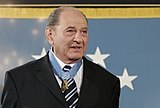Tibor Rubin
| Tibor Rubin | |
|---|---|
 
Tibor Rubin wearing the Medal of Honor he received at the White House.
|
|
| Nickname(s) | Ted |
| Born |
June 18, 1929 Pásztó, Hungary |
| Died | December 5, 2015 (aged 86) Garden Grove, California, U.S. |
| Allegiance | United States of America |
| Service/branch | United States Army |
| Years of service | 1950–1953 |
| Rank | Corporal |
| Unit | Company I, 8th Cavalry Regiment, First Cavalry Division |
| Battles/wars | Korean War |
| Awards |
Medal of Honor Purple Heart |
| Spouse(s) | Yvonne |
Tibor "Ted" Rubin (June 18, 1929 – December 5, 2015) was a Hungarian-born Holocaust survivor who emigrated to the United States in 1948 and received the Medal of Honor for his actions during the Korean War as a United States Army soldier and prisoner of war (POW) from President George W. Bush on September 23, 2005, 55 years later. Rubin was repeatedly nominated for various military decorations, but was overlooked because of antisemitism by a superior. Fellow soldiers who filed affidavits supporting Rubin's nomination for the Medal of Honor said that Rubin's sergeant "was an anti-Semite who gave Rubin dangerous assignments in hopes of getting him killed". In November, 2016, President Obama signed legislation renaming the Long Beach California VA Medical Center after Rubin.
Rubin was born on June 18, 1929, in Pásztó, a Hungarian town with a Jewish population of 120 families, one of six children (by three marriages) of shoemaker Ferenc Rubin.
When Tibor was 13, Ferenc and Rosa Rubin (stepmother) tried to send him to safety in neutral Switzerland, but he was caught and sent to the Mauthausen concentration camp in Austria. He was liberated 14 months later by American combat troops. Both of his parents and his two sisters perished in the Holocaust.
Rubin entered the United States in 1948, settled in New York and worked first as a shoemaker. He then apprenticed as a butcher at Michael Bela Wilhelm's Hungarian butcher shop on Third Avenue in the Yorkville neighborhood for about a year.
In 1949, he tried to enlist in the U.S. Army. He failed the English language test, but tried again in 1950 and passed with some judicious help from two fellow test-takers.
By July 1950, Private First Class Rubin found himself fighting in South Korea with I Company, Eighth Cavalry Regiment, First Cavalry Division. According to lengthy affidavits submitted by nearly a dozen men who served with Rubin in South and North Korea, mostly self-described "country boys" from the South and Midwest, an antisemitic sergeant named Arthur Peyton consistently "volunteered" Rubin for the most dangerous patrols and missions.
...
Wikipedia
